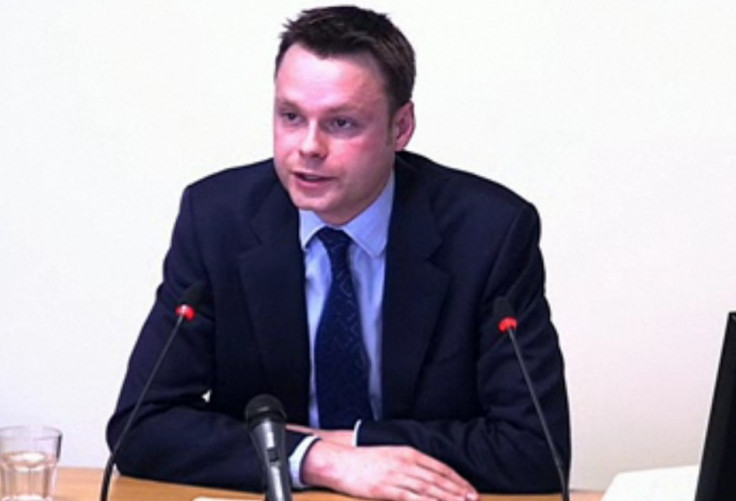Leveson Inquiry: Aide To Jeremy Hunt Admits No Limits on News Corp Contact
Adam Smith tells Leveson Inquiry that News Corporation's Fred Michel exaggerated department's support for BSkyB bid.

Adam Smith, advisor to culture secretary Jeremy Hunt has revealed that no limits were put on his contact with News Corporation during its attempted bid to take over BSkyB.
Smith gave evidence to the Leveson inquiry into press ethics and discussed his view on emails sent between himself and Frederic Michel, News Corps' public affairs director.
The emails raised question marks over the culture secretary's impartiality during the bid process of 2010/2011 and led to Smith resigning.
He told the inquiry that Michel would bombard him with text messages and emails, before revealing how little he was told about the limits he should put on contact with the company.
"I wasn't particularly aware of limits. I would use my judgement on those particular issues....It wasn't uncommon to give advance notice of certain statements. But I would use my judgement," he said.
Counsel to the inquiry Robert Jay QC led Smith through several emails shared with Michel, that appeared to show Smith helping the company through the bid process.
Emails sent by Michel to James Murdoch described Smith - and subsequently Hunt's office - as being "keen to get to the same outcome" and that it "shared [News Corp's] objectives". He also quoted Smith as saying it was "game over" for the bid's opposition once News Corp produced good Undertakings in Lieu.
Smith admitted that "we had a conversation along those lines", but denied the majority of the emotive, positive language attributed to him by Michel.
Smith regulary defended his comments by explaining they were taken out of context and thus misunderstood.
One one occasion, he is seen to reply to a text from Michel asking if News Corp was "in a good place", with "I agree. coverage looks ok. Lets look at this in the morning though."
Smith argued that this was an example of text messages being misunderstood and was in fact referring to Hunt being happy with the reception to a statement he made. He did admit that he was regularly "too loose with my language".
"I'm sure I often say things that aren't Mr Hunt's opinion," he later admitted.
Critics of Hunt have claimed Smith, who described himself as a "buffer" for Hunt, resigned as a scapegoat to save the culture secretary's political career.
When Michel gave evidence at the inquiry he denied that he had boosted the rhetoric in his emails in order to make himself look better. He admitted that he belived Hunt "probably supported" News Corps plurality argument.
The first day of Smith's evidence caused more calls from Labour for Hunt to resign, following the release of a draft email that was sent by Hunt to Smith, and later David Cameron, that showed his personal support for the bid.
At the time of the email, business secretary Vince Cable was arbiter for the bid process, but Labour claim it proves Cameron was aware of Hunt's pro-bid viewpoint before he chose him to take over the position from Cable.
Labour's deputy Leader Harriet Harman called for Hunt to step down in an interview with BBC Breakfast.
She said: "The Prime Minister should never have given him the job. It is clear that Jeremy Hunt was not the impartial arbiter he was required to be and he should already have resigned."
"There are two bits of evidence, actual straightforward evidence, that Jeremy Hunt was not impartial, he was meddling before he even took over the bid and was on the side of the Murdochs," she added.
"The first was that he had to be warned off by the civil servants not to have any more meetings with Rupert Murdoch but he kept up the contact through his special adviser, and secondly he wrote a memo to the prime minister."
When Smith resigned he said: "While it was part of my role to keep News Corporation informed throughout the BskyB bid process, the content and extent of my contact was done without authorisation from the secretary of state,
"I do not recognise all of what Fred Michel said, but nonetheless I appreciate that my activities at times went too far and have, taken together, created the perception that News Corporation had too close a relationship with the department, contrary to the clear requirments set out by Jeremy Hunt and the permanent secretary that this needed to be a fair and scrupulous process.
"Whilst I firmly believe that the process was in fact conducted scrupulously fairly, as a result of my activities it is only right for me to step down as special adviser to Jeremy Hunt."
Hunt insists he will clarify his position when he gives evidence to the inquiry next week.
© Copyright IBTimes 2024. All rights reserved.





